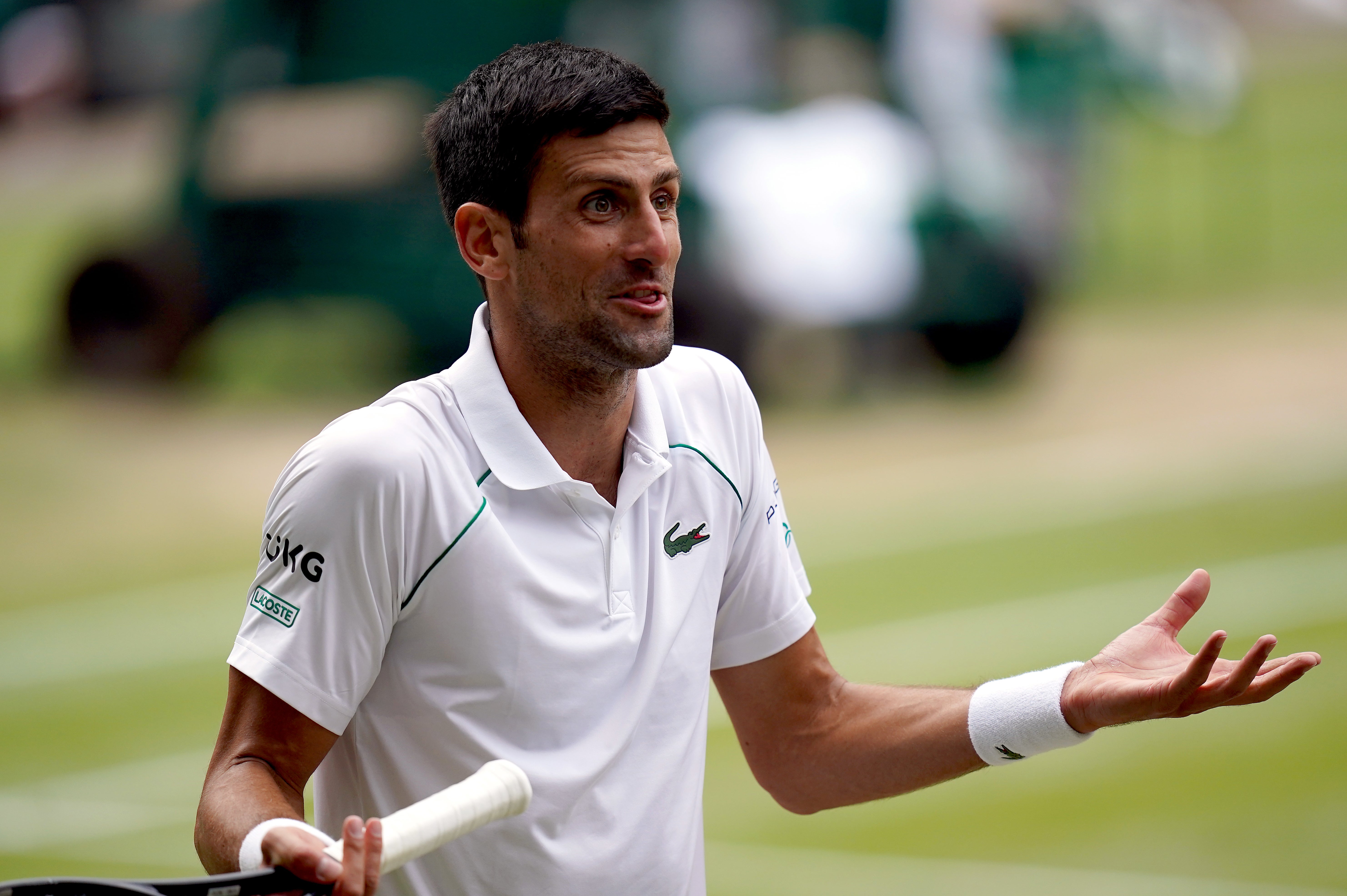Novak Djokovic: The tennis star always seeking to walk his own path
The world No 1’s attempts to play this month’s Australian Open is the latest saga in a career that has been underpinned by dogged self-belief – wherever that leads, write Tom Kershaw and Chris Stevenson


“The one hero in this whole Novak Djokovic saga is Rafael Nadal – and I think [we] should listen to him,” former vaccine minister Nadhim Zahawi said on the radio on Sunday. “I encourage everyone to get their jab.”
He was being asked about the case of the men’s tennis No 1’s possible deportation from Australia, where the Serbian was denied entry after landing in Melbourne last week to defend his Australian Open title. An earlier decision to grant a medical exemption to play had infuriated many living in a country that has some of the world’s strictest Covid rules. The appeal hearing against deportation will be heard on Monday at 10am local time (11pm Sunday GMT).
Djokovic has not disclosed his vaccine status, but in April 2020, before vaccines for Covid-19 were available, said that he was opposed to vaccination before later clarifying his position by adding that he was “no expert” and would keep an “open mind” – but wanted to have “an option to choose what’s best for my body” and “wouldn’t want to be forced” to have one to travel. His lawyers have said a vaccine exemption was granted to enter Australia after a Covid infection on 16 December (although Djokovic tweeted pictures on 17 December of him maskless appearance at a ceremony in Belgrade – it is unclear whether he knew he had Covid when the photos were taken).
It is one almighty mess and Nadal had quite a pointed response that Zahawi was referencing. “The only clear thing for me is if you are vaccinated, you can play in the Australian Open and everywhere, and the world in my opinion [has] been suffering enough to not follow the rules,” Nadal said. “He made his own decisions, and everybody is free to take their own decisions, but then there are some consequences.”
The case in Australia has sparked anger in Serbia and reaction from all over the world. His father, Srdjan, remained adamant that Djokovic was “the Spartacus of the new world” and that “he is like water and water paves its own path”.
His father’s reaction may be indicative, but Djokovic’s unorthodox world view and scepticism of societal norms have been advertised, and self-promoted, for several years. After all, it was in his own book, Serve to Win, that he detailed the moment his transformative gluten-free diet began in 2010, when he self-diagnosed a celiac allergy by pressing a slice of bread against his abdomen.
Djokovic is a genius of his field, and certainly no jester. He is, by most measures, wildly intelligent, a deep thinker, and commands the respect of his fellow players, although – as Nadal shows – they aren’t exactly jumping to his defence. Perhaps, then, the point is what proportion are genuine, obstinate beliefs, and what are actually potentially contrived – an innate suspicion of convention that has been moulded into a competitive edge; the us-against-them mentality that’s enabled him to best harness his talent and become one of the greatest sportsmen in modern history.
In the past, Djokovic has often spoken about coping mechanisms and the value of “mental strength” to comprehend his childhood in the war-torn former Yugoslavia. The 11-year-old boy and his family sheltered in the basement of his grandfather’s flat during Nato’s bombing raids on Belgrade in 1999. He still practised his tennis, but had to move to a different site each day. He was eventually spotted in the mountain resort of Kopaonik, where his parents owned a pizzeria, by Jelena Gencic, who ran tennis camps there – and invited to play.
“After three days I met his parents,” Gencic – who died in 2013 – recalled later to The Independent’s Paul Newman. “I said to them: ‘You have a golden child.’” Djokovic’s “tennis mother” would also encourage his interest in classical music and languages.
He needed mental strength to handle the burden of being a child prodigy and the extremes of junior tennis and into his senior career. He won his first grand slam title, at the Australian Open, at 20, but his physical abilities were sometimes questioned over the next few years – that previously mentioned change in his diet was one factor in 2010 that Djokovic said had pushed him on. Another you could mark was was Serbia’s 2010 victory in the Davis Cup, the national competition. Serbia won the trophy for the first time, with now-Monaco resident Djokovic always being proud of being a sporting ambassador for his country. Djokovic would go on to have a title-laden 2011 and spring forward from there.
During that time, he’s formed his own perspectives and built his own walls to the outside world in pursuit of a singular objective. Take the surgery saga of 2017, when Djokovic insisted a persistent elbow injury should be treated by holistic methods. After eventually resigning himself to surgery, he claimed he “cried for three days straight”. In his eyes, by letting the will of the outside world triumph over his own, he’d “failed”.
It’s easy to see how those traits have transferred into Djokovic’s tennis, too, particularly when he is backed into a corner. In the third round at Wimbledon 2018, for example, when he was jeered by Centre Court after receiving a time violation against home favourite Kyle Edmund. He became consumed by a visceral anger, blowing kisses to the crowd, and barely let down his guard until he clinched a fourth title eight days later. As the irrepressible third wheel to Roger Federer and Nadal, he has perennially been cast as the villain. He is tied with both of his rivals on 20 grand slam wins, but has earned more prize money – $153m (£113m) – than both of them.
Djokovic – who has a son and a daughter with his wife Jelena – has given millions to charity, but his public image is not the same as Federer and Nadal. It was not helped by the exhibition Adria Tour in Serbia and Croatia in the summer of 2020 when the ATP Tour had shut down. Several players contacted Covid during the Djokovic-fronted event and arrangements faced criticism from a number of quarters.
One of Djokovic’s coaches, the former Wimbledon champion Goran Ivanisevic, believes the player is misunderstood. “Sometimes people only pick out the bad things he does,” he told The Times last year. “They don’t see the good he does in helping others. He is the person who is not afraid to speak out, the only tennis player who stands up for the other players. He is the Robin Hood of tennis.”
Ivanisevic believes the tennis world – and others – will miss him when the 34-year-old retires from the sport.
For Djokovic, you feel the situation in Australia is just the next step in the contradiction that has underlined his career. There has always been precious little to differentiate the man from the athlete. His stubborn single-mindedness – or selfishness – has been integral in him becoming such a remarkable player. And while uncertainty rages over whether he will be deported or allowed to defend his title, and regardless of its outcome, the saga will surely only deepen Djokovic in those ways.






Join our commenting forum
Join thought-provoking conversations, follow other Independent readers and see their replies
Comments